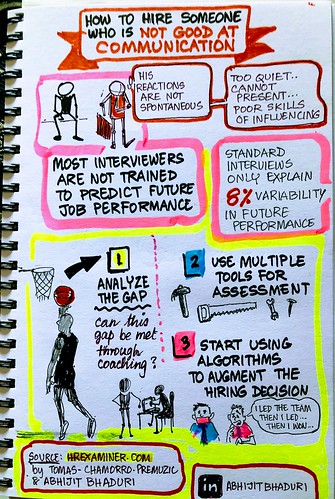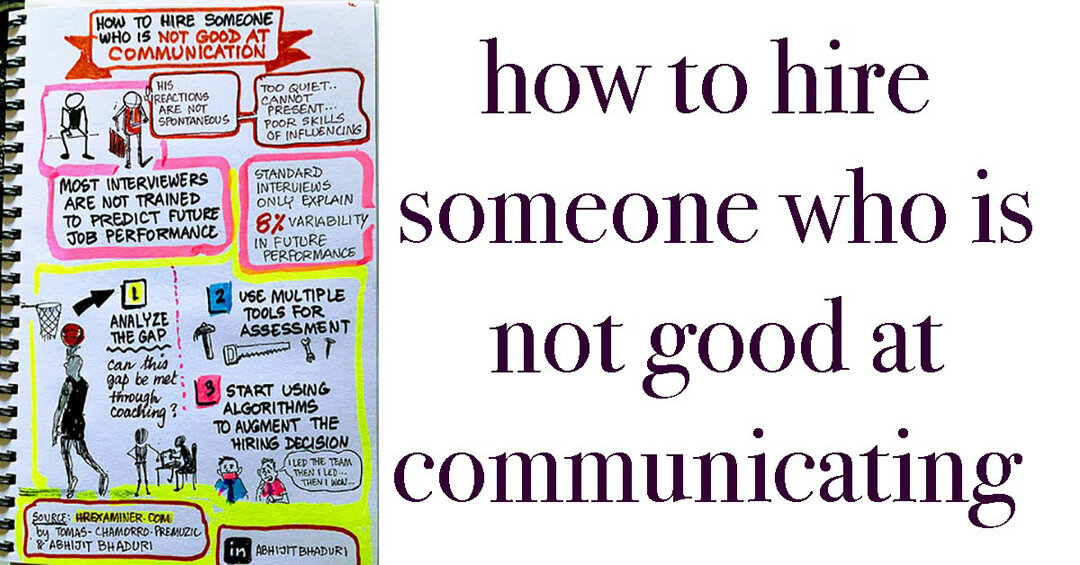How To Hire Someone Who Is Not Good at Communicating
 My co-author Dr. Tomas Chamorro-Premuzic is an international authority in psychological profiling, consumer analytics, and talent management. He is a Professor of Business Psychology at University College London (UCL) and CEO of Hogan Assessments, and has previously taught at New York University and the London School of Economics. If interviews are the dominant method of hiring, is it stacked against those who are not good at communicating (so many of us are in that category). If you are a recruiter, what can you do? Our post for HRExaminerAlthough most of us spend more time communicating online than offline, recruitment methods are still heavily skewed towards analogue or physical communication skills, particularly the job interview. Indeed, interviews favor those who can communicate their ideas fluently and come across as likable.
My co-author Dr. Tomas Chamorro-Premuzic is an international authority in psychological profiling, consumer analytics, and talent management. He is a Professor of Business Psychology at University College London (UCL) and CEO of Hogan Assessments, and has previously taught at New York University and the London School of Economics. If interviews are the dominant method of hiring, is it stacked against those who are not good at communicating (so many of us are in that category). If you are a recruiter, what can you do? Our post for HRExaminerAlthough most of us spend more time communicating online than offline, recruitment methods are still heavily skewed towards analogue or physical communication skills, particularly the job interview. Indeed, interviews favor those who can communicate their ideas fluently and come across as likable.
"What if I am not good at communicating?"
Unfortunately, however, most interviewers have not trained themselves rigorously enough to be able to predict candidates’ future job performance. To make matters worse, once the selected candidates are on the job they are often evaluated by the same people who interviewed them, which transfers the interview biases to their performance appraisals, conveying the illusion of validity. For example, behavioral economists have shown quite compellingly that people have a tendency to ignore information that contradicts their initial beliefs while focusing – and remembering – any events that support them, a reasoning flaw known as confirmation bias. This leads to a large number of hiring mistakes going unnoticed.
Now let us consider the scientific evidence:
In a rigorous, comprehensive analysis of hundreds of studies with more than 32,000 job applicants over an 85-year period by Frank Schmidt and Jack Hunter examined over 500 different jobs— including salespeople, managers, engineers, teachers, lawyers, accountants, mechanics, reporters, farmers, pharmacists, electricians, and musicians— to compare information gathered about applicants with the objective performance that they subsequently achieved on the job. After psychometric test scores – particularly on learning ability – were taken into account, standard interviews accounted for only 8% of the variability in future performance and productivity. In a world where it is still virtually impossible to get hired for any job without going through an interview, this is surely a shocking finding, particularly if we consider the relatively low adoption of psychometric tests in the selection process.Clearly, interviewers have to depend on the candidate to provide evidence that they can do the job and would be a good fit with the company’s culture. This encourages candidates to give socially desirable responses rather than speaking their mind. If someone is not articulate, then it is even harder to convince the interview panel. On the other hand, people who feel very comfortable and come across as charismatic may actually have some antisocial tendencies. For example, people with antisocial and psychopathic tendencies are generally fearless and they often come across as charming and socially skilled in short-term interactions, which can contribute to favorable evaluations by interviewers. Yet just like you don’t marry someone after a first date – at least, most people don’t – you should not hire someone based largely on their interview performance. Unless that performance is closely linked to what they need to do on the job – e.g., face-to-face sales, acting, public speaking, politician, etc.
So what should you actually do?
Here are some data-driven recommendations for minimizing biases against strong candidates who may not do so well during interviews.
1) Analyze the job and the candidate’s development needs
- How much of the job’s success actually depends on communication and interpersonal skills? Is impression management a key driver of job performance, or should it be treated as noise?
- What aspect of the written communication, interpersonal communication or client presentations does the candidate need help with?
- How often would that gap pose challenges? How can that risk be mitigated? Can someone coach this person? Can that part of the job be given to someone who does it well.
2) Use multiple assessment tools
- Ask your star employees – and be sure to work out who they actually are – to go through the hiring process and see if the process would have eliminated some of them. If not, use these data to benchmark future candidates.
- Ensure that your performance evaluation systems focus on actual job performance rather than individual career success. In a perfect world, there would be a strong overlap between the two. But in the real world they are only marginally related – many top performers don’t attain high levels of career success, and some of the most successful individuals are not that good at their job.
- The most effective interview questions are called situational judgment questions. Instead of asking candidates to describe how they handled a unique situation in a previous job or organization, it’s more fruitful to describe consistent situations that candidates could face in this job or organization, and ask them what they would do—or how they would reason. These can be done online, though the key is to use a data-driven approach to link each answer with a meaningful and robust candidate profile: “people you pick X are more likely to do Y”, and so on.
3) Let the algorithms do the work
- The rise of Artificial Intelligence (A) based platforms are helping companies sift through millions of resumes to find the right candidates.
- Skillate, an AI-based recruitment solution platform that helps companies do just that for SAP. Their next feature aims to update candidates’ resumes based on the posts from Facebook, GitHub etc. This will help candidates who may have expertise but do not know how to express it in a way that catches the attention of the employer.
- Bangalore based start-up Belong helps employers seek passive candidates based on their social media posts. PayPal is using Belong’s algorithm to eliminate recruiter bias.
While the general public is usually concerned about these automated methodologies, it is important to understand that the current paradigm of humans rating other humans is not only flawed, but much more likely to result in biased selection decisions and unfair and non-competitive results for both the candidate and the organization. Note that people have a similar reaction when it comes to considering self-driving cars. Although it is estimated that they would save almost 2 million lives a year, most people think they are better drivers than AI, even if they are willing to accept that self-driving cars would probably drive better than other people.Do you think interviews only check for articulation capability but does not predict performance? What is your experience?Published by HRExaminer dt Nov 13, 2017


